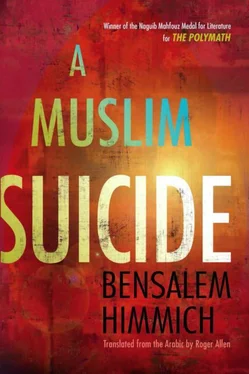"In that case, you have the gift of foresight! Now I can tell you what has actually happened. There was an enormous battle between the Tatars and Mamluks, with both sides armed to the hilt. They both used infantry, cavalry, and artillery. Everyone in Egypt, Syria, and the Hijaz was hoping and praying that God would put a stop to the Tatar advance by granting victory to the Mamluks and their allies."
"Amen, amen! 0 God and Lord of mankind! A Mamluk victory would certainly be the lesser of two evils, although it would obviously strengthen their hold over the Hijaz and even encourage them to set their sights even farther afield. That is the way victorious armies normally behave!"
I stopped talking in order to encourage the governor to share with me his concerns about the Mamluk sultan and their armed forces.
"I'm convinced," he told me tersely, "that the Prophet's descendants here will not suffer any harm from the Mamluks, even if they do assume power and take over from the Ayyubids."
"I pray to God Almighty that He spread the standards of peace and tranquility over all His servants and spare them the consequences of hatred and enmity."
I made do with this one prayer, and my colleague responded with his own "Amen." I decided to keep my own concerns to myself, leaving it to the passage of time to reveal whatever unforeseen or concealed factors might also be involved and to make clear what would inevitably take place. Even so, he did not miss the dour expression on my face.
"I beg you," he asked in a confidential tone, "in the name of God and the sanctity of the Prophet's family, to share with me what troubles you. Is it the same thing that's troubling me as well?"
"What's that, Sir?"
"That the Mamluks, like their predecessors, will try to hang on to the illusion of the efficacy of the Abbasid Caliphate and try to revive it, however rotten it may be…"
"That's precisely what worries me," I replied. "For some time now the Abbasid caliphate has lost its authority; its flame has simply gone out. If a dynasty from this generation decides to cling to its coat-tails, then it can only be for some very particular reason, such as exerting authority and control under the guise of canonical law and the usual justifications based on practice."
"So we clearly share the same views on this subject. Tell me then, holy man of God, which dynasty is there-even if it is in the Maghrib-where legitimate authority and religious leadership are to be found. I will then pledge fealty to their ruler as caliph."
"In our era," I replied without the slightest hesitation, "only the Hafsids in the western regions of Islam-they being heirs to the Almohads and a branch of their noble family-fit that category. Were you to bolster their cause by an expression of fealty and were other sharifs in the Arabian Peninsula and their parties to follow your lead in doing so, their prestige and status would be greatly enhanced. They would be able to unite peoples and regions in the cause of defeating the Christian forces in both the east and in my own long-suffering Andalus."
"God grant you light!" he replied. "Write for me a letter of fealty that I can send urgently to Muhammad al-Mustansir ibn Abi Zakariyya,* the Hafsid ruler. Success comes only through God!"
I did not respond to his request, as a way of showing that I needed to think some more about the entire matter, and in an atmosphere far removed from any demands for rapid action. We now had a conversation about personal matters and our own lives. It became clear that the governor already knew some details about my way of life, but he now asked me to give him some more details about my written works. Just before the noon prayer I asked his permission to withdraw, and he accompanied me to the door.
"Don't forget about that letter," he whispered in my ear. "And don't forget to come and visit me."
With that I made my way through halls and courtyards accompanied by two guards. My movements were closely watched by senior officials and aides, but I decided not to bother myself with worries about their significance.
I spent the rest of the month of Sha`ban dealing with the increasing number of students, offering sessions on the bases of religion and Sufi ethics. Their questions and requests for elucidation also required that I address other ancillary topics. I held the sessions either in the library of my own residence or in the Muwaffaq hostel, also on two occasions in a portico of the Ka`ba Shrine itself. Truth to tell, among the students in Mecca I did not encounter any who were the equals of my students in Murcia and Sabta. They did not possess the same level of intellectual curiosity, breadth of vision, and ability to absorb ideas. The only exception to this was actually Sitt Umama, even though in recent times she had been less assiduous in her attendance.
I did not forget about the letter of fealty that the governor had asked me to compose. Indeed, I sat down on an irregular basis and composed different segments of it, all in anticipation of the time when I would bring the whole thing together. I chose appropriate verses from the Qur'an to go along with the opening of the two suras, Al-Fath and Al-Dukhan. When it came to other source works, I found some support in Muslim,* who says, "The Prophet of God-on him be peace and blessings-said, 'At the end of time there will come a caliph who will share wealth without counting it.' Abu al-'Abbas al-Hamadhani* went further and gestured with his hand toward the Maghribi' I went on to cite another text from Baha' al-din al-Tibrizi in his epic work: "If the fire of the Hijaz goes out, the caliph of Baghdad will be killed. In the Maghrib the rule will remain strong and will extend its word into different regions. Its name will be proclaimed in the pulpits of the Abbasid caliphs, and great benefit will accrue from its passage to the land of India." In order to talk in more precise terms about al-Mustansir's claims, I included the following passage: "I have cited these things so that the rulerGod provide him support! — may realize that he is the one to whom reference is being made and that he is being charged, through God's own power, with the reform of what has become corrupt. In these times of ours there can be no Caliph for the Muslim community other than the person whom we have indicated." I specifically mentioned the Almohads and "their mighty human leader, enabler of the Almohads over the other heretics, mainstay and backbone of the faith, maintainer and propagator of the Islamic religion, and leader of the community of faithful believers in prayer, all in imitation of his father, himself a leader in prestige and glory."
I had to include some words of praise for the Prophet's family in the person of Ali ibn Abi Talib-may God honor his visage! — so I copied al-Hudhali's* statement about him: "He is the Imam, and in him are to be found four aspects (and he possesses them all, even if aspects of anthropomorphism and causality are removed): namely, learning, prudence, fortitude, and noble family."
As I sat there, thinking about all the ideas churning around inside my head, I decided to include some of my own opinions, which were certainly extremely forthright and daring, to the point of constituting a real risk in the uncertain times ahead: "Perhaps the factors that founded and raised the Islamic faith from the eastern regions but then proceeded to destroy it can be restored from the western regions without the need for transfer. Anyone who believes in God and His angels, books, and prophets is obliged to ensure that his goals are not changed and that he does not make do with merely hearing his praises sung. An entire people's limbs have been trammeled by chains of polytheistic worship. It is oppression that has inevitably led them to destruction at the hands of the Turks."
When the month of Sha`ban was almost at an end, I had completely finished the letter, a process that involved condensing its content and fixing its sequence. I did all that without in any way lessening the blunt and direct message in many of its sections. I made a point of specifying the place where it had been composed: facing the Ka`ba on the western side of the sacred enclosure. I assumed that the sender of the letter would add the date and his own seal. All that completed, I put the letter under my pillow and waited for Abu Numa to ask for it.
Читать дальше












